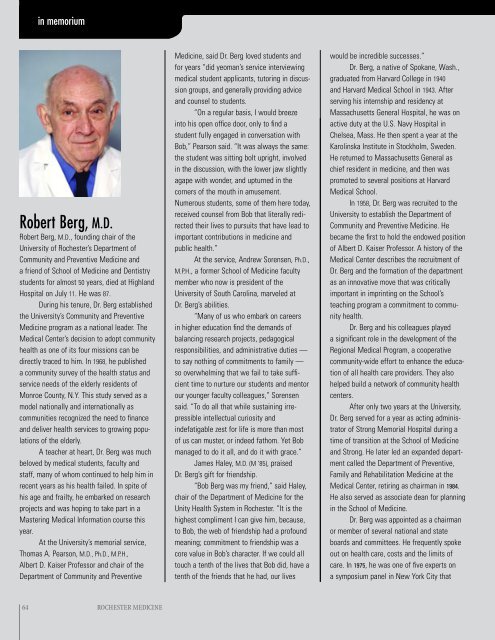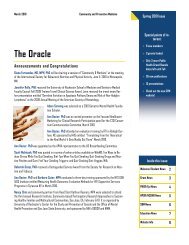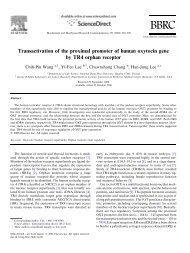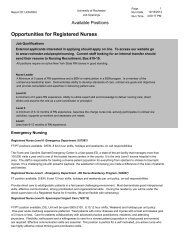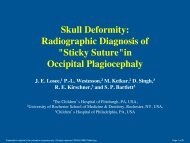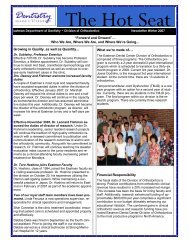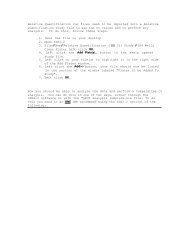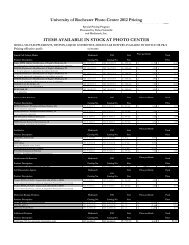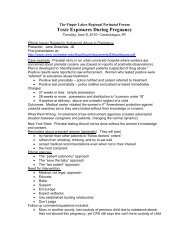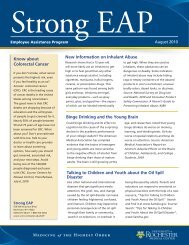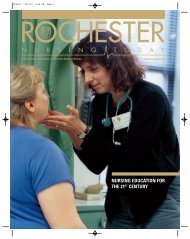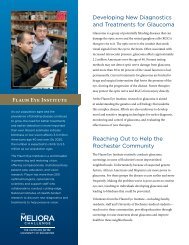Fall/Winter 2006 - University of Rochester Medical Center
Fall/Winter 2006 - University of Rochester Medical Center
Fall/Winter 2006 - University of Rochester Medical Center
Create successful ePaper yourself
Turn your PDF publications into a flip-book with our unique Google optimized e-Paper software.
in memorium<br />
Robert Berg, M.D.<br />
Robert Berg, M.D., founding chair <strong>of</strong> the<br />
<strong>University</strong> <strong>of</strong> <strong>Rochester</strong>’s Department <strong>of</strong><br />
Community and Preventive Medicine and<br />
a friend <strong>of</strong> School <strong>of</strong> Medicine and Dentistry<br />
students for almost 50 years, died at Highland<br />
Hospital on July 11. He was 87.<br />
During his tenure, Dr. Berg established<br />
the <strong>University</strong>’s Community and Preventive<br />
Medicine program as a national leader. The<br />
<strong>Medical</strong> <strong>Center</strong>’s decision to adopt community<br />
health as one <strong>of</strong> its four missions can be<br />
directly traced to him. In 1968, he published<br />
a community survey <strong>of</strong> the health status and<br />
service needs <strong>of</strong> the elderly residents <strong>of</strong><br />
Monroe County, N.Y. This study served as a<br />
model nationally and internationally as<br />
communities recognized the need to finance<br />
and deliver health services to growing populations<br />
<strong>of</strong> the elderly.<br />
A teacher at heart, Dr. Berg was much<br />
beloved by medical students, faculty and<br />
staff, many <strong>of</strong> whom continued to help him in<br />
recent years as his health failed. In spite <strong>of</strong><br />
his age and frailty, he embarked on research<br />
projects and was hoping to take part in a<br />
Mastering <strong>Medical</strong> Information course this<br />
year.<br />
At the <strong>University</strong>’s memorial service,<br />
Thomas A. Pearson, M.D., Ph.D., M.P.H.,<br />
Albert D. Kaiser Pr<strong>of</strong>essor and chair <strong>of</strong> the<br />
Department <strong>of</strong> Community and Preventive<br />
Medicine, said Dr. Berg loved students and<br />
for years “did yeoman’s service interviewing<br />
medical student applicants, tutoring in discussion<br />
groups, and generally providing advice<br />
and counsel to students.<br />
“On a regular basis, I would breeze<br />
into his open <strong>of</strong>fice door, only to find a<br />
student fully engaged in conversation with<br />
Bob,” Pearson said. “It was always the same:<br />
the student was sitting bolt upright, involved<br />
in the discussion, with the lower jaw slightly<br />
agape with wonder, and upturned in the<br />
corners <strong>of</strong> the mouth in amusement.<br />
Numerous students, some <strong>of</strong> them here today,<br />
received counsel from Bob that literally redirected<br />
their lives to pursuits that have lead to<br />
important contributions in medicine and<br />
public health.”<br />
At the service, Andrew Sorensen, Ph.D.,<br />
M.P.H., a former School <strong>of</strong> Medicine faculty<br />
member who now is president <strong>of</strong> the<br />
<strong>University</strong> <strong>of</strong> South Carolina, marveled at<br />
Dr. Berg’s abilities.<br />
“Many <strong>of</strong> us who embark on careers<br />
in higher education find the demands <strong>of</strong><br />
balancing research projects, pedagogical<br />
responsibilities, and administrative duties —<br />
to say nothing <strong>of</strong> commitments to family —<br />
so overwhelming that we fail to take sufficient<br />
time to nurture our students and mentor<br />
our younger faculty colleagues,” Sorensen<br />
said. “To do all that while sustaining irrepressible<br />
intellectual curiosity and<br />
indefatigable zest for life is more than most<br />
<strong>of</strong> us can muster, or indeed fathom. Yet Bob<br />
managed to do it all, and do it with grace.”<br />
James Haley, M.D. (M ’85), praised<br />
Dr. Berg’s gift for friendship.<br />
“Bob Berg was my friend,” said Haley,<br />
chair <strong>of</strong> the Department <strong>of</strong> Medicine for the<br />
Unity Health System in <strong>Rochester</strong>. “It is the<br />
highest compliment I can give him, because,<br />
to Bob, the web <strong>of</strong> friendship had a pr<strong>of</strong>ound<br />
meaning; commitment to friendship was a<br />
core value in Bob’s character. If we could all<br />
touch a tenth <strong>of</strong> the lives that Bob did, have a<br />
tenth <strong>of</strong> the friends that he had, our lives<br />
would be incredible successes.”<br />
Dr. Berg, a native <strong>of</strong> Spokane, Wash.,<br />
graduated from Harvard College in 1940<br />
and Harvard <strong>Medical</strong> School in 1943. After<br />
serving his internship and residency at<br />
Massachusetts General Hospital, he was on<br />
active duty at the U.S. Navy Hospital in<br />
Chelsea, Mass. He then spent a year at the<br />
Karolinska Institute in Stockholm, Sweden.<br />
He returned to Massachusetts General as<br />
chief resident in medicine, and then was<br />
promoted to several positions at Harvard<br />
<strong>Medical</strong> School.<br />
In 1958, Dr. Berg was recruited to the<br />
<strong>University</strong> to establish the Department <strong>of</strong><br />
Community and Preventive Medicine. He<br />
became the first to hold the endowed position<br />
<strong>of</strong> Albert D. Kaiser Pr<strong>of</strong>essor. A history <strong>of</strong> the<br />
<strong>Medical</strong> <strong>Center</strong> describes the recruitment <strong>of</strong><br />
Dr. Berg and the formation <strong>of</strong> the department<br />
as an innovative move that was critically<br />
important in imprinting on the School’s<br />
teaching program a commitment to community<br />
health.<br />
Dr. Berg and his colleagues played<br />
a significant role in the development <strong>of</strong> the<br />
Regional <strong>Medical</strong> Program, a cooperative<br />
community-wide effort to enhance the education<br />
<strong>of</strong> all health care providers. They also<br />
helped build a network <strong>of</strong> community health<br />
centers.<br />
After only two years at the <strong>University</strong>,<br />
Dr. Berg served for a year as acting administrator<br />
<strong>of</strong> Strong Memorial Hospital during a<br />
time <strong>of</strong> transition at the School <strong>of</strong> Medicine<br />
and Strong. He later led an expanded department<br />
called the Department <strong>of</strong> Preventive,<br />
Family and Rehabilitation Medicine at the<br />
<strong>Medical</strong> <strong>Center</strong>, retiring as chairman in 1984.<br />
He also served as associate dean for planning<br />
in the School <strong>of</strong> Medicine.<br />
Dr. Berg was appointed as a chairman<br />
or member <strong>of</strong> several national and state<br />
boards and committees. He frequently spoke<br />
out on health care, costs and the limits <strong>of</strong><br />
care. In 1975, he was one <strong>of</strong> five experts on<br />
a symposium panel in New York City that<br />
64<br />
ROCHESTER MEDICINE


